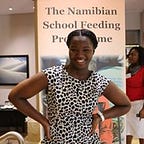Women take the lead in boosting livelihoods in rural Sierra Leone
How cash transfers are powering women’s efforts to improve food security and livelihoods in Sierra Leone
There is so much food that could be produced from the soils of Sierra Leone, if only the farmers — especially women — were not constrained by a myriad of challenges such as post-harvest losses, as well as inadequate farming inputs and techniques. Musu Rogers, a groundnut and rice farmer from Helebu community in Pujehun district in the Southern Province, knows this first-hand.
“We are limited to using our hands, cutlasses, and hoes which make it very difficult to develop large hectares for the cultivation of rice or groundnut,” says Musu, a mother of two children.
Clearing and draining swamps, digging ponds for growing rice and developing marshlands into cultivable areas without adequate tools means that although she, and other farmers, have the strength and will to cultivate large quantities of crops that would feed their families and result in surpluses to be sold in the markets, they have been unable to do so for years.
With agriculture being the life-blood of the Sierra Leonean economy employing over 60% of the country’s labour force, the government as well as its international partners are stepping up action to improve the situation for farmers, especially women farmers who are the backbone of what is mostly subsistence agriculture.
The United Nations World Food Programme (WFP), through its Food Assistance for Asset creation (FFA), activities has been supporting farmers to develop lowland irrigation structures in Pujehun district to enable them to cultivate rice and nutritious vegetables throughout the year. By being able to control water and cultivate their swamps throughout the year, these farmers in flood prone Pujehun are more resilient to the effects of climate change, which is exacerbating food insecurity.
The participants of this FFA project receive cash transfers, farming tools and training in improved agricultural practices from WFP. This is making a difference to people’s lives by reducing their hunger and improving their livelihoods.
The project has a particularly positive impact on the lives of women, who in the context of Sierra Leone are facing greater challenges than men as they often have limited access to land, agricultural extension services and technologies.
Musu, who is a participant, feels motivated to devote more time in agriculture by growing rice and planting groundnut, which benefits her family — giving her children more nutritious food and keeping them healthy. The cash transfers empower her to make swift investments in improved agriculture inputs such as seeds and fertilizers for planting, enabling her to grow more food.
“I feel blessed…this money means a lot to me because I know I can use it to continue farming so that I have food to put on the table for my family to eat,” says Musu.
A 2018 multi-country WFP study demonstrated that programmes using cash transfers can lead to impacts that can empower women and men, girls and boys. This can strengthen decision-making; improve livelihoods; reduce social exclusion and support women’s leadership.
Before WFP’s intervention, Hawanatu Sannoh, a farmer from Peje chiefdom, Pujehun district struggled to buy enough groundnut seeds for planting. Now, she is hopeful that with the money that she has received she will be able to purchase more seeds for planting, increasing her family’s income.
“ When I invest the money I receive into growing groundnuts, which I will sell after harvest, it will be very profitable for me and my family,” says Hawanatu.
Kula Kumba, a member of the women farmers group who have irrigated their farmland with FFA support to cultivate rice and vegetables in the village of Bandasuma, Pujehun District, explains that WFP has helped her greatly through providing items for swamp work such as pans, hoes, shovels and cash.
“I feel happy for all the support WFP has provided, I have the appetite to work more,” says Kula.
WFP’s initiative addresses immediate food needs through providing benefiting farmers with cash, voucher or food transfers while they engage in building communities assets. In the long term, assets created through FFA will improves the long-term food security and resilience of vulnerable communities.
Find out more about food assistance for assets
